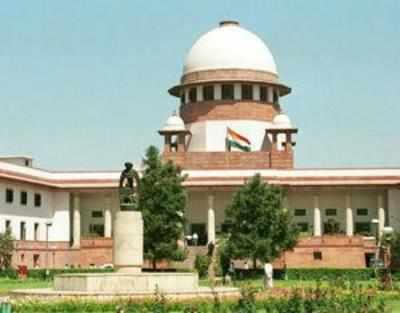- News
- Business News
- India Business News
- SC strikes down National Tax Tribunal
Trending
This story is from September 25, 2014
SC strikes down National Tax Tribunal
A five-judge bench headed by Chief Justice RM Lodha said the Act passed by Parliament in 2005 is "unconstitutional" as the National Tax Tribunal (NTT) encroaches upon the power of higher judiciary.

A five-judge bench headed by Chief Justice RM Lodha said the Act passed by Parliament in 2005 is "unconstitutional" as the National Tax Tribunal (NTT) encroaches upon the power of higher judiciary.
NEW DELHI: The Supreme Court on Thursday declared the National Tax Tribunal (NTT) unconstitutional.
The tribunal was envisaged to function like National Green Tribunal (NGT) in the taxation field.
A five-judge constitution bench headed by Chief Justice R M Lodha said that the Act passed by Parliament in 2005 is "unconstitutional" as the National Tax Tribunal (NTT) encroaches upon the power of higher judiciary, which can only decide issues involving substantial laws and not a tribunal.
SC struck down several provisions of NTT Act, which were key to the legislation.
SC said the legislation was unconstitutional as it failed to transfer the convention and characters of an adjudicatory body, akin to judicial powers, to the NTT.
SC also ruled that chartered accountants cannot represent a tax litigant in a revenue tribunal.
The apex court passed the order on a batch of petitions challenging the constitutional validity of NTT contending that there was a grave danger that judiciary will be substituted by a host of quasi-judicial tribunals which function as departments of various ministries.
The first petition on the issue was filed in 2006 when the Madras Bar Association had challenged the setting up of NTT and later many other lawyers bodies followed suit.
The NDA government had justified the creation of NTT, saying that the idea of creating tribunals was to unclog the backlog of cases in the high courts.
(With inputs from PTI)
The tribunal was envisaged to function like National Green Tribunal (NGT) in the taxation field.
A five-judge constitution bench headed by Chief Justice R M Lodha said that the Act passed by Parliament in 2005 is "unconstitutional" as the National Tax Tribunal (NTT) encroaches upon the power of higher judiciary, which can only decide issues involving substantial laws and not a tribunal.
SC struck down several provisions of NTT Act, which were key to the legislation.
Since the pith and substance of the Act has been found unconstitutional, the entire law needed to be struck down, the top court said.
SC said the legislation was unconstitutional as it failed to transfer the convention and characters of an adjudicatory body, akin to judicial powers, to the NTT.
SC also ruled that chartered accountants cannot represent a tax litigant in a revenue tribunal.
The apex court passed the order on a batch of petitions challenging the constitutional validity of NTT contending that there was a grave danger that judiciary will be substituted by a host of quasi-judicial tribunals which function as departments of various ministries.
The first petition on the issue was filed in 2006 when the Madras Bar Association had challenged the setting up of NTT and later many other lawyers bodies followed suit.
The NDA government had justified the creation of NTT, saying that the idea of creating tribunals was to unclog the backlog of cases in the high courts.
(With inputs from PTI)
End of Article
FOLLOW US ON SOCIAL MEDIA















